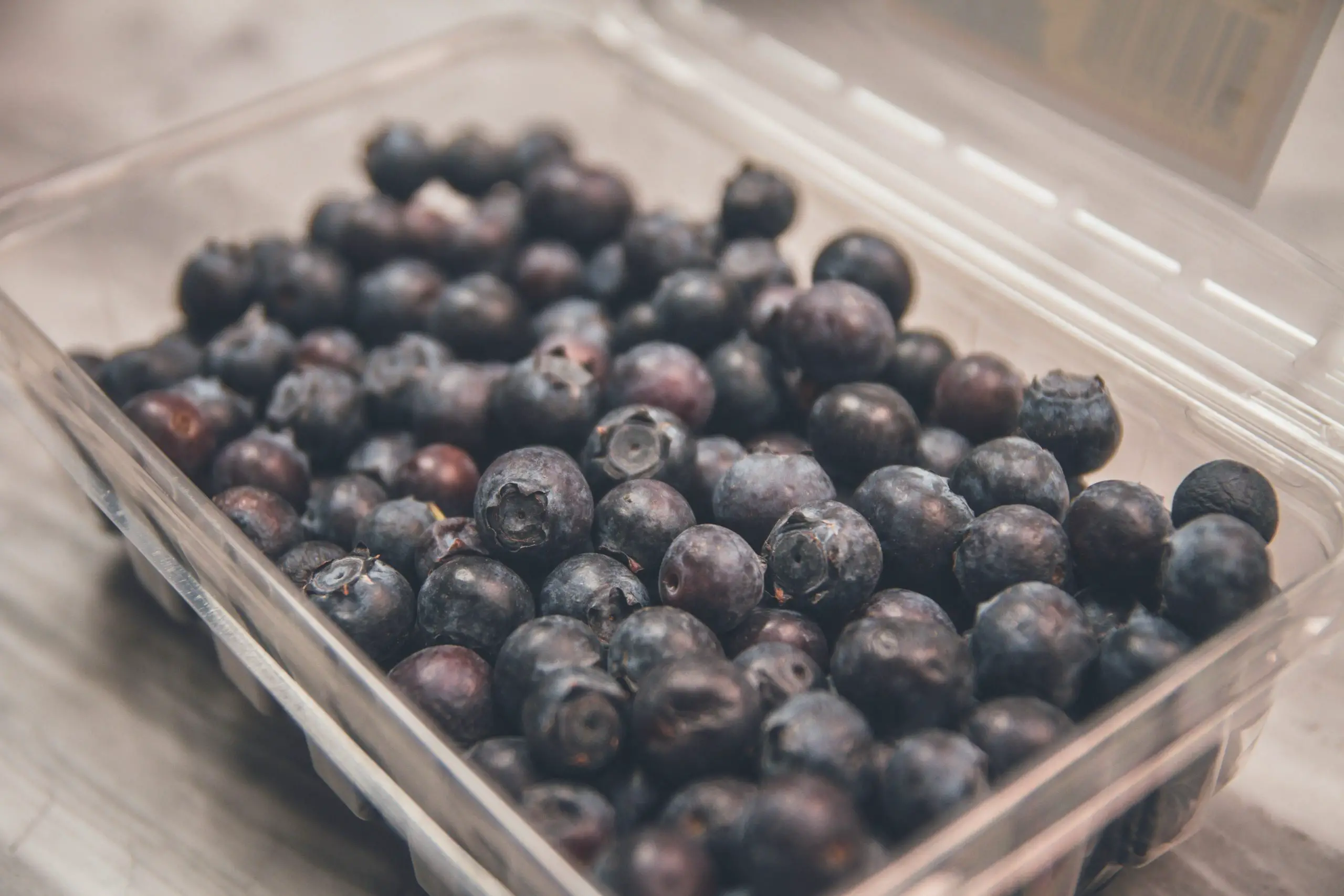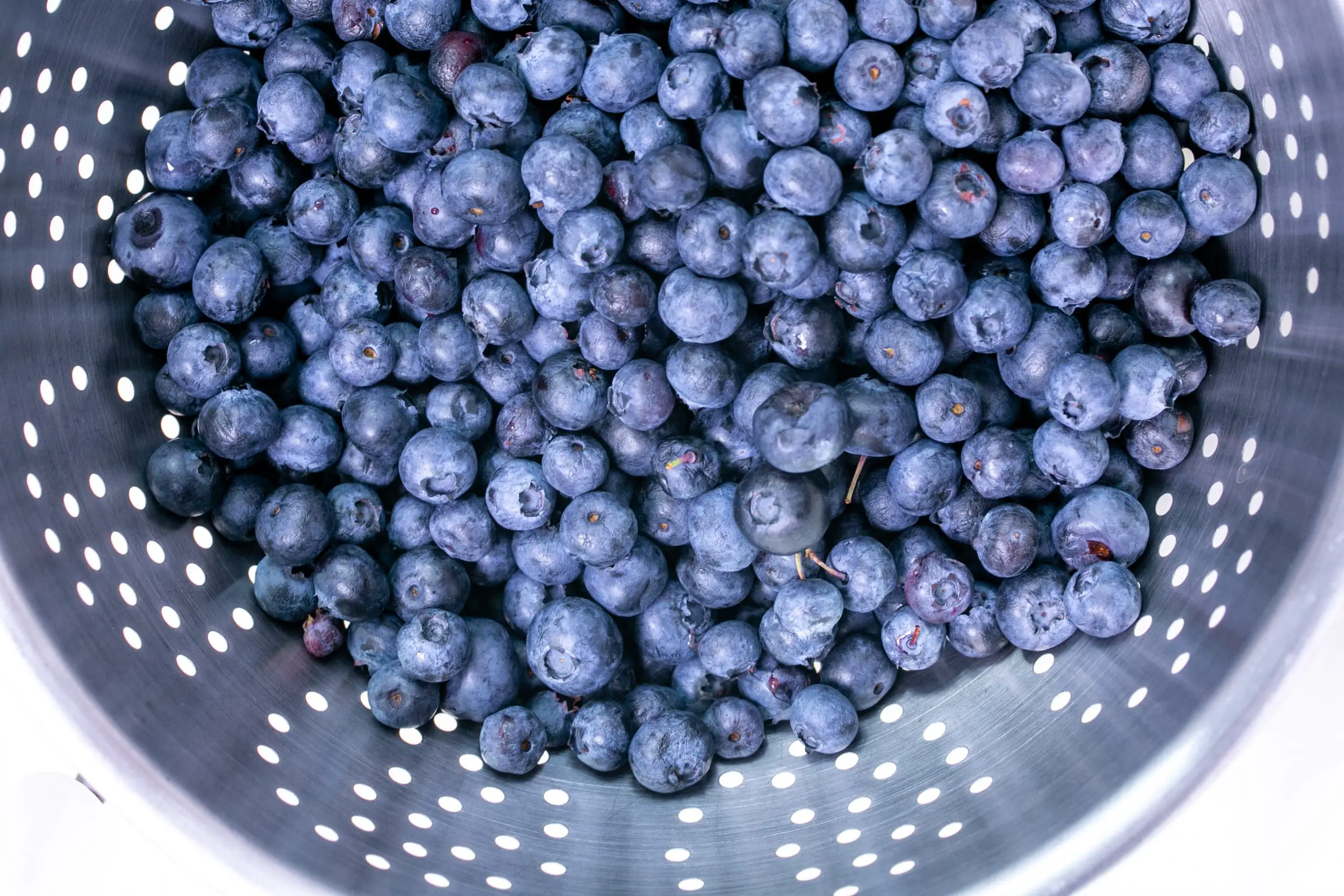You’ve come to the right place if you’ve ever wondered how to store blueberries in the refrigerator properly. Blueberries can be baked with tasty summer fruit, added to yogurt or a salad, or eaten plain as a nutritious snack. Unfortunately, poor storage practices might lead to unappealing blueberries, which occasionally cause berries to become mushy and mouldy. In this article, you may learn how to store blueberries in the freezer and refrigerator properly.

A fresh handful of blueberries are a wonderful addition to your diet due to their high antioxidant content. So, while they’re plentiful and inexpensive, we always keep a punnet or two in the fridge to eat fresh or use in dishes. Keeping a stash of fresh blueberries in the fridge is one of the most common ways to store blueberries.
How to Store Blueberries?
When looking for blueberries, seek blueberries that are a deep purple colour and appear lovely and plump. Avoid any punnets with wrinkled skin, redness, or that appear damp. Because size does not signify maturity or ripeness, you can choose larger or smaller berries according to your preferences. Blueberries have a natural ‘bloom’ on their surface that appears pale and silvery; this is a good thing because it keeps the blueberries fresh.
Here Are Some Ways to Store Blueberries:
Selecting Blueberries
When selecting blueberries at the shop, look for full, rich purple berries and even have a frosty flush. The berries should be solid rather than mushy, and the skins should be taut rather than wrinkled. Inspect the container’s bottom for any mould or juiciness, which may suggest that smashed berries are concealed in the mixture.
Prepping Blueberries for Storage
When storing blueberries in the fridge, it is best not to wash them until the day you intend to eat them. Water and humidity produce an ideal environment for germs, mould, and decay.
When you bring your berries home, take them out of the container and place them in a large shallow dish. This will allow you to find and remove any red or green berries, which are underripe and will be sour and bitter, as well as those that are bruised, broken, or mouldy.
Remove any leaves, twigs, or debris from fresh-picked blueberries you have harvested or purchased from a farmers’ market, and inspect for insects. Place the berries in a colander or sieve and rinse under cold running water if you intend to consume or cook with them within a day, whether in a cooked or raw recipe. Then, place the berries in a single layer on a sheet pan lined with lint-free paper towels or tea towels and gently roll them around to dry. Allow the blueberries to dry uncovered at room temperature for about an hour, rolling them around occasionally to ensure they are not moist.
Storing Blueberries in the Refrigerator
Find a basket-like container and thoroughly wash it. You can use a porcelain bowl with slits or the original plastic basket that came with the blueberries. Small holes in the container will be required to give proper ventilation.
- Anything made of metal should be avoided. Blueberries have the potential to react with metal, causing staining and spots on both the berries and the metal container.
Fold a paper towel into quarters and insert it into the basket’s bottom. Using a larger container, such as a bowl, use multiple sheets of paper towels without folding them.
On top of the paper towel, place the blueberries. The paper towel will absorb moisture and prevent mould from growing.
Keep the blueberries in the fridge. Avoid storing them in the coldest part of the fridge, as the cold will destroy them. The berries should be stored on the middle or bottom shelf. Avoid storing them in the crisper. Most crispers are overly humid and lack adequate circulation, which could result in mould growth. Blueberries can be stored in the refrigerator for five to ten days.
- The top of the refrigerator is the coolest.
Storing Blueberries in the Freezer
Blueberries should be spread in a single layer across a shallow tray. You will first freeze the berries individually, keeping them from sticking together and clumping. A skillet, casserole dish, or baking sheet can also be used. If using a metal container, line it with parchment paper first to protect the blueberries.
Put the tray in the freezer and leave it there until the blueberries are frozen. It will take two to three hours for the berries to freeze.
Place the blueberries in a freezer-safe (resealable) Ziploc bag. Remove the tray from the freezer with care so that no berries spill. You can shovel them into the bag by hand or just put the tray over the bag’s opening.
Place the Ziploc bag in the freezer and seal it. The berries will keep for up to a year.
- Although frozen blueberries do not need to be thawed before baking, washing them with cool water until the water runs clear may help prevent them from releasing too many juices during baking.
Tips
Here Are Some Tips to Store Blueberries:
1. Avoiding Rinsing Blueberries
Avoid rinsing your berries until you’re ready to eat them to preserve them fresh. This is inconvenient since you have to rinse them whenever you are hungry. However, blueberries can be rinsed ahead of time and rinse and wiped dry with cool water. However, don’t over-rinse them, or the fruit will turn mushy.
After removing the berry shell, store it in an airtight container. Place the berries in the refrigerator’s centre or top-shelf. Avoid storing them in crisper drawers because the humidity levels are too high. Avoid putting them in the bottom or crisper drawer because they are moist. Blueberries can be preserved in the refrigerator for 5 or 10 days if properly stored.
2. Avoiding Storing Them among Other Fruits and Vegetables
There are a few things to consider when it comes to keeping berries. While seasonal berries, such as blueberries are more susceptible to mould than other types of fruit, you can reduce their chances of mould by keeping them dry. Washing berries should be avoided since moisture and mould go together. Avoid keeping them in the crisper drawer as well. This traps moisture and humidity, hastening the rotting process.
Wash blueberries well before keeping them to avoid mould and germs. This is a good idea because mould and germs can quickly spread throughout the refrigerator. However, if the berries are already rotten, this procedure will not work. If they’re unpleasant and mushy, it’s probably time to eliminate them, and they’ll probably spoil shortly anyway.
3. Using Dehydrator
There are numerous advantages to dehydrating blueberries and they are inexpensive and can also be stored for a longer amount of time, extending their shelf life. The procedure is straightforward and may be completed home using a dehydrator or oven. Here’s one of my mother’s advice: To keep the flavour of the blueberries, cook them with sugar and lemon juice. You can enjoy blueberries for up to a year without needing to buy them every month this way.
When using a dehydrator, choose a low-wattage setting and carefully follow the guidelines. Check the blueberries daily, and don’t allow them to dry out too much, as this could result in a mushy snack. You can also increase the heat setting to speed up the drying process, but make sure to monitor the temperature of the blueberries with a thermometer.
4. Keeping Them Plump
Here are some techniques for keeping your berries fresh and luscious in the fridge. The first tip is to keep your berries in a refrigerated case, which will keep the blueberries fresher for longer. To absorb moisture, a separate layer of paper towel should be placed at the bottom of the blueberry container. Line the bottom of a salad spinner with paper towels to keep your berries fresh.
The berries should then be dried. A salad spinner, slanted ceramic bowl, or plastic basket would suffice. Ensure that the container has small holes. You can also lay a folded paper towel at the bottom of the container. Place the paper towel in the bottom without folding it. Rinse the berries and place them in an airtight container or a zip-top plastic bag after a few minutes. This will keep the berries fresher for a longer period.
5. Prevent Blueberries from Rotting
Instead of keeping your blueberries in the fridge, you can dry them if you’re worried about their freshness. Your blueberries will stay fresh using this method for up to a week. Blueberries can, however, become mouldy if kept in the refrigerator with their stems still attached, so keep that in mind. It will help if you put the blueberries on a tray covered in paper towels to prevent this issue. Check your blueberries carefully for mould before putting them away. Throw away any rotten berries right away. They can also be washed in a solution of water and white vinegar. The mould spores that are not apparent to the naked eye will be killed by vinegar in water.
Fresh berries do, in fact, decay quickly, but it’s crucial to avoid storing them in plastic containers. They will rot considerably quicker if you store them in airtight containers with inadequate ventilation. Keep them on the middle shelf of the refrigerator instead. They will remain more palatable in this manner. They can be dried using a salad spinner as well. By employing this technique, you can guarantee that your blueberries stay fresh for at least five to ten days.
When Storing Blueberries, Should I Wash them First?
There’s no rush to wash blueberries unless you intend to consume them immediately. The back of the refrigerator and washing right before consumption are the best storage options for these tiny summer fruits.
Are Blueberries Good after Two Weeks?
When stored in the refrigerator, blueberries are only good for two weeks. You’ll need to freeze the blueberries if you want to keep them for a long time. Blueberries that have been frozen have a shelf life of up to three months. Once thawed, blueberries can only be stored in the refrigerator for one week before losing their quality.
Why do Berries Go Bad Quickly?
Blueberries spoil quickly when exposed to various natural conditions in your kitchen and refrigerator. Moisture is the primary cause of fresh blueberries going bad quickly, generally within two days if not refrigerated. Light and humidity are two more variables that degrade the freshness of the berries, causing them to rot and acquire natural pollutants that can cause foodborne illnesses. Berries should not be eaten if they develop rotten, white, or green fuzzy patches.
Berries purchased at the grocery store frequently have a “use by” or “best by” date printed on the box, indicating when they will go bad. However, many blueberry containers do not include this information. The easiest approach to keep mildew and rot at bay on your blueberries is to preserve them properly.
How Can Blueberries be Kept Fresher for Longer?
Blueberries should be stored in a low-humidity, low-moisture area of your refrigerator, such as the centre rack. Place in an airtight container and freeze. Frozen blueberries can be kept for 6 to 10 months, whereas refrigerated blueberries can only be kept for five days.
Conclusion
Blueberries are fantastic as a snack, either eaten straight from the container or as a cereal topping. These nutritious berries might be a great way to start the day if you’re looking for breakfast ideas. One of the finest methods to store blueberries is to freeze them. Frozen blueberries are a great ingredient to keep on hand for various dishes, whether you purchased more than you need for immediate use or have some that are starting to lose their freshness.

